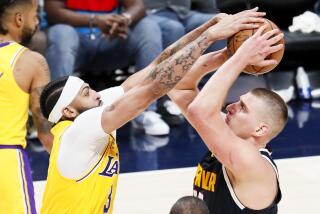Dan Jenkins’ Insufferable New Novel Really <i> Does</i> Play Hurt : YOU GOTTA PLAY HURT, <i> by Dan Jenkins,</i> Simon & Schuster, 22; 353 pages
- Share via
One of the strange things about journalism is that it often appears at its best in the sports pages.
Why should the meeting of ball with bat, fist with chin, helmet with turf prove so inspiring to so many writers?
A moment’s reflection provides the answer: It’s easy to get the facts and statistics right in sports coverage, and no one really cares, even then, if they are reported correctly, all of which means that the sportswriter can devote himself, more than most nonfiction writers, to style, theme, tone, color.
If you aren’t good at those things, you’re soon out of the sportswriting game, for the majority of fans already know the score and turn to the sports pages mainly to get a good read.
OK, that’s enough lit. crit. for one day. “You Gotta Play Hurt” is by “Semi-Tough” author Dan Jenkins, after all, and Jenkins will never be confused with Norman Mailer or V. S. Naipaul.
But this novel, about a year in the life of a sportswriter, demands at least fleeting analysis, for there must be some explanation for Jenkins’ having written a book that can best be described as insufferable. My pet theory: Jenkins wants it both ways; he wants to ridicule big-time sportswriting even as he portrays it as heroic, romantic, high-spirited and macho. Jim Tom Pinch, the book’s narrator, is a misanthropic, know-it-all columnist for a magazine attempting to rival Sports Illustrated, and Jenkins apparently wants us to admire him for his Philip Marlowe-like cynicism and self-proclaimed devotion to high principle.
But “You Gotta Play Hurt” never takes off as a novel because Pinch is a thoroughly unsympathetic character, no better than the world he inhabits--and takes to previously unknown depths.
Sports coverage, from sky-cams to sideline interviews to hyperventilated prose, is a ripe topic for satire.
In setting up Pinch as his spokesman, however, Jenkins has missed this easy target, for Pinch seems to have remained in the business only for money and notoriety. Whether covering skiing in Europe, boxing in Vegas or college football in Texas, he no longer even pretends to care about his work--unless, of course, it gives him the chance to humiliate someone else.
Pinch’s pleasures are few: running up enormous expense accounts, burlesquing the intelligence of professional athletes and sneering at other sportswriters--except female sportswriters, who naturally fall in love with him (despite the fact that Pinch occasionally procures prostitutes for his employers).
In short, “You Gotta Play Hurt” is an adolescent male fantasy in which prejudice--just about every derogatory epithet you can think of makes an appearance here--is excused as jest, and in which the author’s alter ego gets all the best lines. And there are good lines, some of which can be printed in a daily newspaper.
There’s the purported rewriting of Dickens to read “It was the best of times--and, ironically--the worst of times”; Pinch’s three marriages, of which the narrator says, “I got canceled due to lack of interest”; the month of May, in which “the only two ‘sporting’ events of national interest are those where horses and cars do all the work.” But good quips are few and far between, and in the meantime the reader must endure innumerable scatological and sexual jokes, most of which are unfunny. At times it’s difficult to believe that Jenkins had an editor: who could find humor, even of the black variety, in Pinch’s calling Dachau “a Nazi theme park”? Pinch--who would no doubt justify the quip by saying that those who failed to laugh at it are spoilsports--is a very ugly American, and no novel that portrays him fondly will win many hearts. A running gag in “You Gotta Play Hurt” is Pinch’s nasty letters to an editor who has commissioned a nonfiction book describing a year in Pinch’s life and is apparently unsatisfied with what Pinch has written to date.
It’s tempting to assume that these missives represent Jenkins’ revenge on a real-life editor; if that is the case, the gag badly misfires. Part of being a professional athlete is listening to coaches when you’re off your game, and “You Gotta Play Hurt” is the work of someone working himself off the team.
Next: Carolyn See reviews “How Boys See Girls” by David Gilmour (Random House).
More to Read
Go beyond the scoreboard
Get the latest on L.A.'s teams in the daily Sports Report newsletter.
You may occasionally receive promotional content from the Los Angeles Times.










